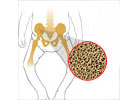University of Michigan researchers say that irregularities in the movement of iron in cells may underlie a disease known as Type IV mucolipidosis (ML4), the symptoms of which may include
Irregularities in the movement of iron in cells may underlie a disease known as Type IV mucolipidosis (ML4), University of Michigan researchers report. The symptoms of this condition may include mental retardation, poor vision and diminished motor abilities.
Assistant Professor Haoxing Xu, lead author of the study, has revealed that the same deficit may also be involved in ageing and neurodegenerative diseases like Alzheimer's and Parkinson's.During the study, the researchers focused on a protein called TRPML1 because a mutation in the gene that produces this protein is know to cause ML4, though the protein itself has never been shown to be involved in iron transport.
The team said that the only only protein with that distinction was DMT1, which facilitates iron uptake in the gut and in cells that will become red blood cells, but not in most other cell types.
"Essentially all cells, including nerve cells and muscle cells, need iron. We wondered what happens in those cells where DMT1 isn't found, and we thought there must be an unidentified iron transporter protein, possibly TRPML1," Nature magazine quoted Xu as saying.
The researchers recorded TRPML1 activity in the lysosome, a tiny pocket where the protein nestles. They found that the protein was actually capable of ferrying iron out of the lysosome.
For determining whether interfering with that ability might result in ML4 symptoms, the team studied defective TRPML1 proteins bearing the same mutations as those found in ML4 patients.
Advertisement
Xu said that iron became trapped in the lysosome when TRPML1 was defective, leading to the formation of a brownish waste material, lipofuscin, known as the "ageing pigment".
Advertisement
"How lipofuscin causes problems in neurons and muscles is not clear, but it's believed that this is garbage that, in time, compromises the normal function of the lysosome. And we know the lysosome is important for all kinds of cell biology, particularly the recycling of intracellular components, so if it's damaged, the cell is going to suffer," Xu said.
Abnormal accumulation of lipofuscin is also linked with disorders like Alzheimer's disease, Parkinson's disease and macular degeneration, as well as the ageing process.
"In a sense we can think of ML4 as really early onset of aging," Xu said.
"If we can somehow manipulate the lysosome iron level, we probably can provide a treatment for the patient. We're not far enough along for those kinds of experiments yet, but now we know enough to work toward that goal," the researcher added.
Source-ANI
RAS/SK















